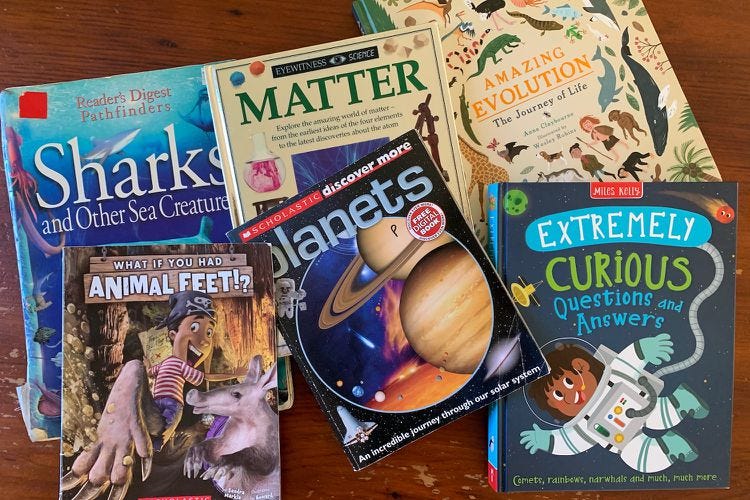I have been thinking about reading this week, and the gift that books are to one’s life, and how worried I am that more kids aren’t reading for pleasure. The UK’s National Literacy Trust released a survey last fall that found more than half of children and young adults in that country do not enjoy reading in their free time. Reading enjoyment rates have fallen to the lowest level since the charity began tracking data in 2005.
This has real consequences beyond the obvious fact that kids have one less thing to do when they’re not on digital devices. Kids who don’t spend time reading miss out on important language development, emotional awareness, and basic knowledge, as well as a useful skill that will make them more successful in life.
Swapping books for online content doesn’t cut it, either. A new study from the University of Valencia found that print reading “could boost comprehension skills by six to eight times more than digital reading does.” Digital texts tend to have lower linguistic quality than print, and the reader maintains a shallower relationship with them. “[S/he] doesn’t fully get immersed in the narration or doesn’t fully capture the complex relations in an informative text,” one study author explained.
So, why aren’t kids reading?
Some blame the analytical approach to literature that now dominates school curriculum. Students are often encouraged to analyze text excerpts, rather than let a book’s momentum carry them from cover to cover. While it’s important to emphasize critical reading skills (and the ability to decipher between truth and non-truth), we can’t forget to teach our kids the profound pleasure that comes with reading whole books and flavouring our days with an undercurrent of thoughtful words.
In The Atlantic, Katherine Marsh described a middle-school class that was told they “might not have time” to finish To Kill a Mockingbird. She found this outrageous:
“You can’t teach kids to love reading if you don’t even prioritize making it to a book’s end. The reward comes from the emotional payoff of the story’s climax; kids miss out on this essential feeling if they don’t reach Atticus Finch’s powerful defense of Tom Robinson in the courtroom or never get to solve the mystery of Boo Radley.”
Others blame smartphones—a compelling argument, too. We know phones to be enormously distracting and constantly accessible. They fragment our attention and condition our brains to crave small chunks of information. As Jonathan Haidt said, the mere presence of a smartphone in our field of vision is a drain on our focus. Given the choice between a book that requires considerable effort to get into and engage with or a phone that offers instantaneous entertainment, what’s a child going to choose? You can hardly blame them for taking the path of least resistance.
This doesn’t mean we should give up trying. Kids still need to read for their own good, for the sake of their parents’ sanity, and to become better, more interesting people who happen to know more about the world than they would otherwise and are empathetic to other people. We have to get kids reading more, and for that, I have some advice based on personal experience.
On building a bookish family
My family are big readers. Our house is full of overflowing bookshelves and there are stacks of books everywhere on the floor, on side tables, beside beds. It would be fair to say reading is my three boys’ main form of entertainment, along with outdoor play. (And eating.) I attribute this to a number of factors.
Remove points of friction.
The absence of digital media is a huge asset. My kids don’t have phones (they’re 8, 12, and 14), so that’s one source of distraction eliminated. It makes books more appealing because they are not competing with something flashy, shiny, and loud.
I often think of James Clear’s lessons in Atomic Habits and the concept of addition by subtraction. He writes: “When we remove the points of friction that sap our time and energy, we can achieve more with less effort.” If your child doesn’t have a phone, iPad, computer, or TV to suck them in, they’ll look for other things to do. And if they encounter books, they’ll pick them up.
Make books accessible.
The next step is to surround your children with books wherever and whenever they might be looking for something to do. As Daniel Willingham recommended, you should “change your home so that reading is the most appealing activity available when your child is looking for something to do… Put books in places where your child gets bored. Put a basket of books in the minivan. Put a basket of books in the bathroom.”
Give them nonfiction.
The books on offer should be a wild mix of topics, fiction and non. Kids love novels, but they also love facts. Never underestimate the fascination and entertainment that great nonfiction books can provoke in a child. My kids love sharing the random things they’ve learned from books. Some examples shared at the dinner table:
Your feet sweat more than any other part of your body.
A pack of velociraptors could take down a full-grown T-rex, despite only being the size of a dog.
Yeti crabs are massive and live atop deep-sea vents. They eat the bacteria that emerge from those vents and attach to their hairy legs.
Apparently, kids’ nonfiction books are a secret weapon for Jeopardy champion James Holzhauer, who appreciates how they package information in a fun, approachable way. He said:
“I have a strategy of reading children’s books to gain knowledge. I’ve found that in an adult reference book, if it’s not a subject I’m interested in, I just can’t get into it. I was thinking, what is the place in the library I can go to get books tailored to make things interesting for uninterested readers? Boom. The children’s section.”
Speaking of the library…
Use it! That’s what it’s for. Save money and cut down on (some) of the clutter and check books out of the library every week. Grab anything that looks remotely interesting. You have no idea what’s going to captivate your kid’s curiosity. Whenever I get a recommendation or read an intriguing review, I place a hold at the library. This keeps a steady and varied flow of books coming into the house.
Model reading.
I’ve talked before about parental modeling as a powerful instructional tool, and it applies to reading, too. Kids have to see their parents reading if they’re going to do it themselves. We also need a societal shift wherein brain/intellectual health is prioritized as much as physical health. Reading is like going to the gym—for your brain. Set aside a chunk of time to do it, and any amount is better than none. Considering the average adult spends four hours a day on their phone, it should be reasonable to find some time to read.
Create nice atmosphere.
The feeling of a space shapes our choice of activities. Lighting and seating matter. Kids gravitate to soft chairs beside windows or with good reading lights. They need privacy. We use our fireplace daily in the winter to make the living room more inviting; the kids want to be there. In the summer, they fight over who gets the hammock on the porch.
We can—and must—turn around the sad decline of children reading for fun. I know it is possible. My family has now gotten to the point where a kid will wander into the living room, see what the others are doing, grab one of the many books lying on the rug, and flop onto the couch. Eventually, all of us will be sitting silently with books (unless they’re giggling aloud at Calvin and Hobbes), and I will look up from my book with a little feeling of triumphant relief before going back to whatever story has engrossed me.
You Might Also Like:
Adult Screen Resolutions for a New Year
The Art of Family Dinner
On Reading More Books






My daughter is in Grade 11, she told me that for Grade 10 English, they didn't read all of Romeo and Juliet, they just did bits of it and watched some of the movie - is that all we think teens are capable of understanding? I don't get a sense there are many works covered in English class, not when I think back on my high school days to what we used to read. That said, she is doing more reading of her own at home - and so am I! I was always a big reader and currently belong to three different book clubs so I always have something on the go, trying to be the model here!
Out of all your suggestions, I really think kids seeing their parents reading is absolutely the one to prioritize!